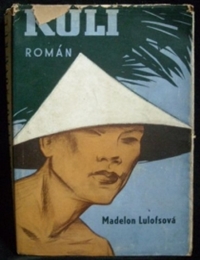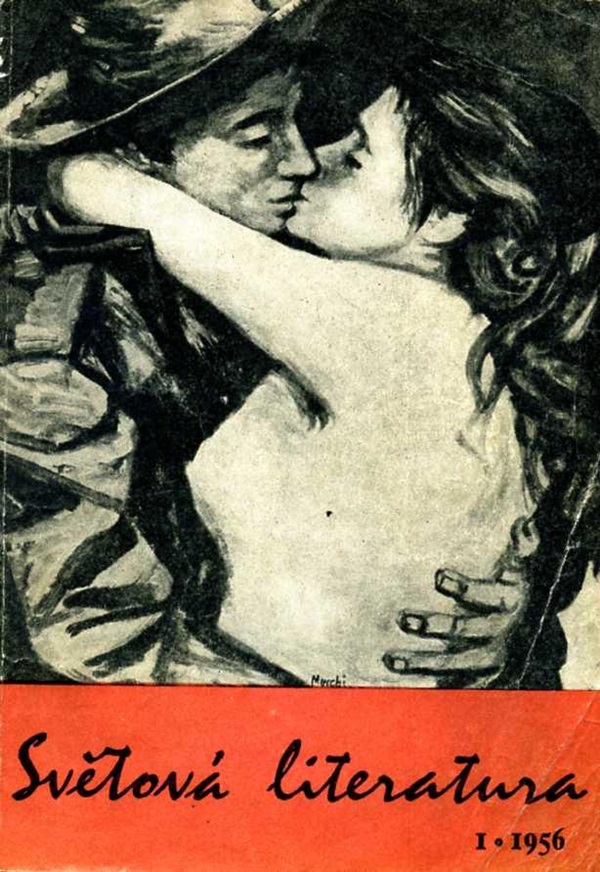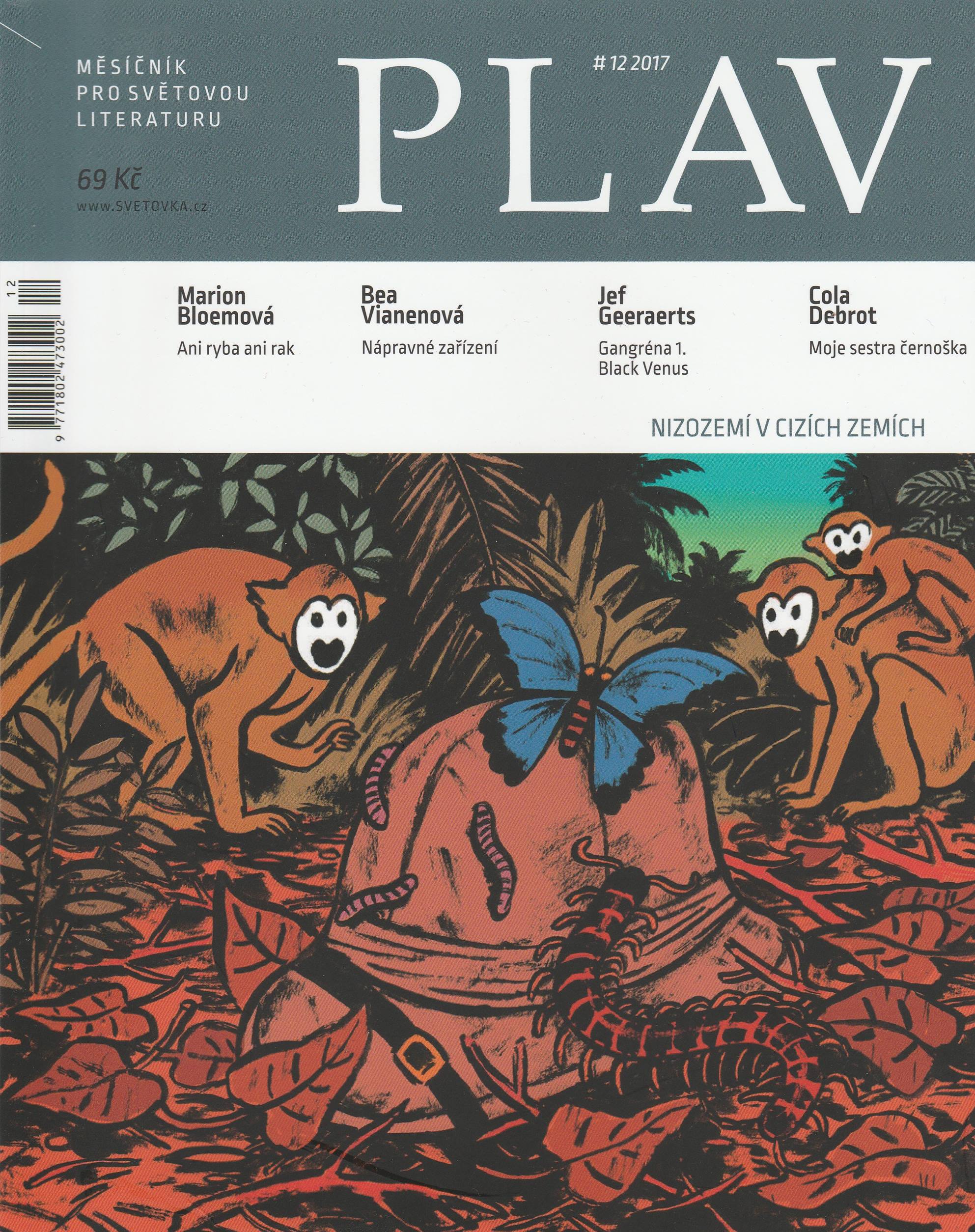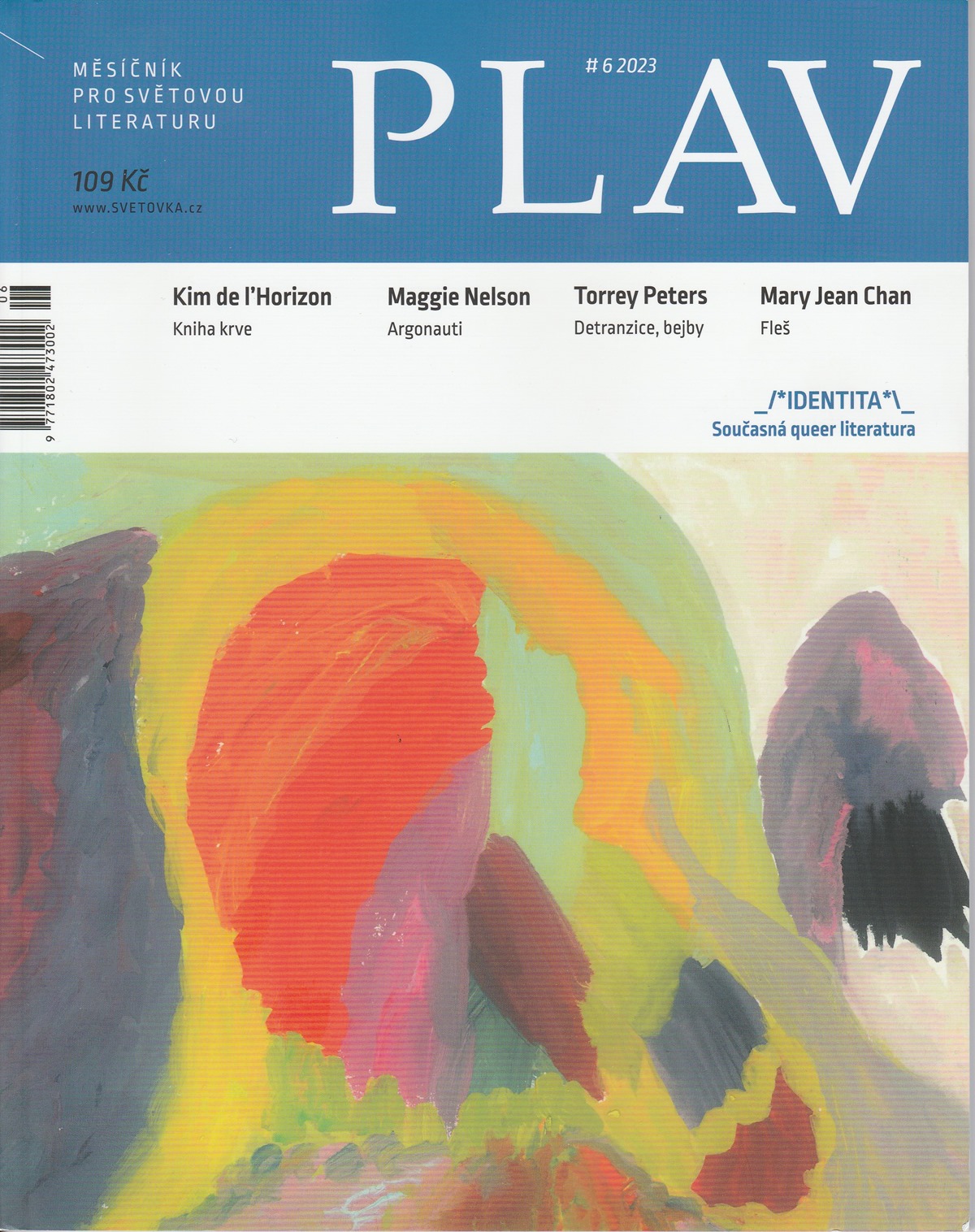A Changing View on Diversity in Czechia
with a Focus on Translations from Dutch-Language Literature
On this page we look at the changing attitude of the main Czech journal for foreign literature, Světová literatura (World Literature), and its successor PLAV, Měsíčník pro světovou literaturu (PLAV, Monthly Review of World Literature) towards diversity. Here, the ‘other’ is understood both as an ethnic other and as a gender-different other, the latter playing a role from the end of the twentieth century onwards.
Diversity concerned initially the ethnic other. In the 1930s, Czechs became interested in the Dutch East Indies because the shoe firm Baťa started importing rubber from there and also built a factory in Java. Whereas the Czechs themselves had actually been a sort of colony of Austria-Hungary, there was a certain distrust of colonial states. Hence, for example, Madelon Székely-Lulofs’ novels Rubber (1931, Rubber, 1987; Czech translation Guma klesá, 1935), Koelie (1932, Coolie, 1987; Czech translation Kuli, 1937), and De Hongertocht (1936, The Hunger Trip; Czech translation Hladová výprava, 1939), which showed negative sides of Dutch rule in the Dutch East Indies, were successful in Czech translation.
Looking at the other

Dust cover of the Czech translation Kuli (Prague 1937) of Koelie by Madelon Stékely Lulofs (copy: Library Dutch Studies Olomouc)
The decolonisations of the 1940s and 1950s, and especially the Dutch so-called ‘Politionele acties’ (Police Actions) of 1946-1948 in Indonesia (basically a last Dutch colonial war) sharpened the critical eye of the Czech reading public. The Czechs sympathised with the new Republik Indonesia. This is visible in the preface to the first complete Czech translation of Multatuli’s Max Havelaar, made by ex-diplomat and freemason Rudolf Jordan Vonka, published in 1947. Yet the picture remained strongly an Eurocentric one, partly because several colonial novels by the popular Dutch writer Johan Fabricius (1899–1981), such as Het Eiland der Demomen (1941, Island of Demons, Czech translation Ostrov démonů, 1947) or Halfbloed (1947, Halfblood, Czech translation Z dvojí krve, 1948) were among the widely translated and widely read Dutch-language authors.
The Caribbean only came into Czech view under the Communist regime, particularly because of its strong ties with revolutionary Cuba. In the 1950s, for instance, several collections of poems by the poet Nicolás Guillén (1902–1989), who had been exiled from Cuba on the eve of the Cuban revolution and was a guest in Czechoslovakia for a while as a refugee, were translated. The Dutch Caribbean remained relatively out of focus.
It is noteworthy that the important anti-slavery book Wij slaven van Suriname (1934, English We slaves of Suriname, 2022) by Anton de Kom (1898–1945) was never translated into Czech, although it was considered at least twice, as evidenced by two presentation copies of, respectively, the German translation Wir Sklaven von Surinam (1935) published in the USSR and the Spanish translation Nosotros, esclavos de Surinam (1981) of the book published in Cuba, in the National Library in Prague.
Světová literatura

The first issue of Světová literatura (1956), photo: Slovník české literatury
After the Communists took power in February 1948, the number of translations from the ‘capitalist countries’ fell sharply. However, zo meet the interest of the reading public (and to exercise control over what was published), the journal Světová literatura (World Literature) was founded in 1956. Until its dissolution in 1996, it came out six times a year, publishing Czech translations of poems, short stories and extracts of novels by writers from all over the world. The print run grew from 4,000 in 1956 to 26,500 by the end of the 1960s. Until the 1980s, this print run remained fairly stable (Zelinský 2007).
At the time, ‘the other’ was mainly former colonised people in the Third World. In September 1963, for instance, the Prague professor of Anglistics Zdeněk Vančura (1903–1974) devoted a long article to English-language literature in the Caribbean. By far the best-known Caribbean writer, V.S. Naipaul (1932–2018), was featured in the June 1976 issue, which, in addition to another review article on Caribbean literature by the Orientalist and Africanist Vladimír Klima (born 1936), also contained articles on Angolan and Ghanaian literature, and a short review article by the most important translator from Dutch Olga Krijtová (1931–2013) on Dutch literature from Vondel to Frans van Isacker. From the then Dutch Caribbean, a piece from the 1976 debut by Sonia Garmers (born 1933), Lieve Koningin, ik zend u hierbij mijn dochter (Dear Queen, I hereby send you my daughter), was published in Světová literatura as late as in 1989.
Olga Krijtová in 1960, photo: Archive Krystof Krijt
Concerning ‘the gender-different other’, the communist regime was by no means positive towards homosexuality. Nevertheless, Czechoslovakia was among the first European countries to decriminalise homosexuality - homosexual relations were removed from the penal code in 1961. Yet even in a rather progressive magazine such as Světová literatura attitudes towards homosexuality remained somewhat uneasy. A good example is the review of the well-known black American civil right’s activist and writer James A. Baldwin (1924-1987) who played an important role in the gay liberation movement in an article from 1965 about four then most important American writers. The article discussed his then published novels Go, Tell it to the Mountain (1951, Czech Jdi a hlásej to z vrchů, along with If Beale Street Could Talk in Beale Street Blues, 1974), Another Country (1962, Czech Jiná země, 1988) and Giovanni’s Room (1956). The latter was the most overtly homosexual of his early novels, focusing on an American man living in Paris and his feelings and frustrations with his relationships with other men in his life, particularly an Italian bartender named Giovanni whom he meets at a Parisian gay bar. The novel provoked many discussions about homosexuality, bisexuality and problems with homophobia
The author of the article, Petr Pujman (1929–1989), a son of the famous Communist writer Marie Pujmanová (1893–1958), being one of the most important Czech translators from English who had himself several problems with the Communist regime, was a progressive thinking man. His reviews of Baldwin’s novels are generally positive. Nevertheless, he had clearly some problems with the openly gay novel, as show sentences like the following in his review of Giovanni’s Room in the article (Pujman 1965: 188):
One form of the incommunicability of a work of art lies in the situation where the reader is unable to recognize himself in the work, that is, to recognize his own experience. This is precisely the case in Giovanni’s Room, and thus the book escapes all the pathos of human tragedy. [...] Thus, we struggle in vain with the revulsion that rises up in us at the depiction of homosexual eroticism and of the story in general, even though we make a great effort to look at it all dispassionately, objectively and with distance.
Dutch-language literature played a pioneering role precisely in sexual relations that were considered deviant at the time – and was sometimes not translated for that very reason, even though Olga Krijtová tried to get Jan Wolkers (1925–2007) published in Czech, for example. Thus, in a review of the manual Uitnodiging tot de vertaalwetenschap (1979, Invitation to Translatology) by Raymond Van den Broeck and André Lefevere, she sighed about her unsuccessful attempts to get works by Wolkers published (Krijtová 1981: 246–247):
In fact, the motives that sometimes lead to the mitigation, moderation or erasure of problematic areas in “bowdlerizing” translations are applied at the initial stage when deciding whether or not to recommend a particular work for translation and its inclusion in the editorial plan. I am thinking, for example, of the doubts in the introduction of books in which there is, so to say, a different conception of love, different approaches to eroticism and sex than we are used to. These doubts are nowadays especially experienced by the lecturer of books from contemporary Western or Nordic languages. For example, we accept homophilic love and lesbian relationships as a natural part of the classical literature of ancient Greece and Rome, but they strike us, not quite rightly, when choosing contemporary works. [...] Let us take at least one example from Dutch literature. Although one of the most important contemporary authors, Jan Wolkers, was published years ago (1967) in the Slovak and Czech versions of Světová literatura in a representative sample of several short stories, a book translation of his key novels was eventually not published by any publishing house for the reasons given, even though they are works with critical social overtones.
After the Velvet Revolution of 17 November 1989, Czech society changed rapidly. In 1990, the same year the World Health Organisation removed homosexuality from the list of mental illnesses, the age for heterosexual and homosexual relations was equalised in Czechoslovakia. In 1993, homosexuality was removed from the same list in the Czech Republic. This can also be seen in the latest volumes of Světová literatura. In the 1994 volume, for example, there was an issue specifically devoted to different forms of I, under the title “Já” je někdo jiný (“I” is someone else). One of the articles of a triptych “Já” v trojí podobě lásky (“I” in a threefold way of love) is dedicated to the Russian symbolist and bisexual female poet Marina I. Tsvetaeva (1892–1941). The Czech writer and translator Monika Zgustová (b. 1957) describes her sympathetically in her introduction to a translation from Tsetaeva’s letters, in which her bisexuality plays a major role (Zgustová 1994: 158):
Throughout her life, she tries to fulfil her desire with relationships both platonic and carnal, epistolary and homosexual; Mandelstam, Pasternak and Rilke are among her love friends, while the writer Sofia Parnok and the actress Sonia Holliday, with whom she has a stormy relationship between 1914 and 1919 (she lives with Sofia Parnok), awaken in her a sensuality she had not known until then. Tsvetaeva devotes to lesbian love her cycle of poems The Girlfriend, the novella Sonia’s Story and a long essay Letter to an Amazon (1933), addressed to the Parisian Sapphic Queen Natalia Barney; Tsvetaeva does not ignore possible social sanctions, but she is not afraid of them, she does not attach any weight to them, she despises them.
The journal Světová literatura more or less lost its right to exist after the Velvet Revolution when censorship disappeared – a special “window on the world” was not longer necessary. It stopped in 1996.
PLAV

Cover of PLAV 1997, No. 12, "Nizozemí v cizích zemích". Copy Library Dutch Studies, Olomouc
The name PLAV is an acronym of Překladatelé – Literáti – Autoři – Vykladači (Translators – Literati – Authors – Interpreters).The journal was set up in 2005 to replace Světová literature but focusing more on translation issues. It is published ten times a year. The issues are arranged either geographically (e.g. no. 7/8 of 2007 with the title Obrázky z Nizozemska a Flander – Pictures from the Netherlands and Flanders – was devoted to Dutch-language literature) or thematically (thus, no. 5 of 2022 Zeměkrev – The Land of Blood – was devoted to literature by female authors on menstruation, for example). The tone of the magazine is always nuanced, as the introductory word by editor Eva Marková in the menstrual issue shows:
Dear Ladies, dear Sirs,
Whatever your experience with menstruation, know that reading this issue will be neither unpleasant nor painful, despite the fact that these adjectives are often associated with the perception of menstruation. The female cycle is not often talked about or written about in public – and if it is, it tends to be at the level of journalistic activism rather than literature. Even there, however, one can encounter certain reflections of a poetic function: some menstruators have their days or junk, some get it and are on the moon, others are visited by Aunt Irma or Little Red Riding Hood... We give menstruation different names because it is a largely taboo subject.
PLAV regularly devotes attention to literatures from or about countries outside Europe. Thus, 2017, no. 12, Nizozemí v cizích zemích – The Low Countries in foreign countries – was devoted to postcolonial literature in Suriname, the Antilles, Indonesia and the Congo, focusing on authors such as Anil Ramdas, Bea Vianen, Marion Bloem and Lieve Joris. The introduction defined the theme of the issue (Klímeš 2017: 1):
Dear Ladies, dear Sirs,
A striking feature on the political map of the world in the second half of the twentieth century is the collapse of colonial empires as a result of the Second World War and the associated emancipatory processes. The territories of many countries rode the wave of decolonisation and seized the opportunity to break free from colonial rule. The then colonies of the Kingdom of the Netherlands and Belgium, whose literary form will be explored in the pages of this issue, are no exception. The translation of all the texts from the Dutch was carried out by a translation team led by Lucie Sedláčková, the issue's expert consultant.

Cover of PLAv 2023, No. 6, "_/*Identita*\_". Copy Library Dutch Studies, Olomouc
In terms of sexual diversity, PLAV devoted an entire issue to queer for the first time in 2011 with the slightly provocative title God Save the Queer. From the introduction, it is clear that the editors were aware that this was still a fairly controversial topic in the Czech Republic at the time (Handl 2011: 1):
Queer is weird, deviant, perverted; originally primarily a swear word (queers, queer bastards...). In keeping with the good tradition of artistic and social movements, the externally ascribed pejorative has been taken up by the actors themselves to give it meaning according to their will. [...]
The texts are unusual for Plav and at times provocative. I hope that the provocation in this case will lead to reflection, not rejection, and preferably also to the breaking of some stereotype. I can’t help but recall the words of an unnamed translator at an unnamed event when she complained that everyone writes about drugs, violence and homosexuality now because it makes money. The idea that writing about same-sex relationships constitutes some potentially shocking curiosity is, I fear, still widespread. But then it’s fair to ask: who’s “weird” here?
Starting in the second half of the 2010s, the debate on LGBT+ equality began to grow strongly in the Czech Republic. In 2016, for instance, the Constitutional Court of the Czech Republic ruled that the ban on adoption of children by registered same-sex partners was unconstitutional. Despite this, the ban remained in place. The debate was reopened in late 2023, as one of the ruling parties tabled a bill in June 2023 to give registered partners the same rights as married couples.
PLAV again devoted an issue to LGBT+ issues in the same month of June 2023, this time titled _/*Identita*\_ (_/*Identity*\_). Among other things, the issue devoted attention to inclusive language use, in Slavic languages because of the morphological compulsion to make a choice between a masculine, feminine or neuter word gender, an even more brisker topic than in north-western Europe. The introduction was in style (Mitlenerová 2023: 1):
Dear Readership,
the first queer issue of Plav was published in 2011. “I read it and thought it was (like many others) a bit too gay,” wrote Kateřina Bártková, the author of the concept, in the early days of the new issue. So this time we decided to abandon the perspective of cis gay men altogether and build the issue around the concept of FLINTA* (an English acronym for “femme, lesbian, intersex, non-binary, trans, agender”) – the literature of non-binary people and queer women. The concept included a significant linguistic challenge in the form of translating the language of non-binary literary characters, both autobiographical and fictional. [...]
During the preparation of the issue, I stumbled over various arguments: “it's hard to read,” “everyone must find themselves in the generic masculine,” “I only use the asterisk when I want to write a swear word on the internet.” My argument is that I wish the world could be improved every time as easily as when you use gender-inclusive language to say, “I know gender is a spectrum, and I’m okay with that.” By language here, I mean the written kind, but I look forward to seeing maybe spoken language start to transform in interesting ways as well.
Conclusion
Between 1956, when Světová literatura began and now lies about three-quarters of a century, roughly three generations. When Světová literatura started, the 'other' was rather the capitalist enemy, further the non-European fellow traveller in socialist countries in Africa, South America and Asia. Literature on homosexuality was discussed, but people were uncomfortable with it.
Gradually, both Czech society and Světová literatura became more open. For the magazine, however, the new competitive environment of the reborn capitalist became fatal in 1996.
PLAV was set up from the beginning as a progressive journal with thematic issues. However, PLAV also shows, how Czech society is changing and starting to become more open to LGBT+ as well as non-European cultures.
(Wilken Engelbrecht)
References
Anonymous, ‘O časopisu’, URL: https://www.svetovka.cz/o-casopisu/ (accessed 29 January 2024).
Engelbrecht, Wilken: ‘The Formation of a Literary Canon of Dutch and Flemish Literature in Translation’. In: Engelbrechtová, Jana (ed.). Dutch – Flemish – Central European Relations. Palacký University in Olomouc, 2015, p. 70-84.
Engelbrecht, Wilken: ‘De “geest van Vonka” of hoe een slechte vertaler de Nederlandstalige literatuur propageerde’. In: Spiegel der Letteren (2019), jrg. 61, nr. 1, p. 25-56.
Engelbrecht, Wilken: Van Siska van Rosemael tot Max Havelaar. Receptie van Nederlandstalige literatuur in Tsjechische vertaling tussen 1848 en 1948. Academia Press, Gent 2021.
Handl, Antonín: ‘God save the queer – Úvodník’, PLAV 2011, No. 5, p. 1.
Klíma, Vladimír: ‘Karibská mozaika.’ Světová literatura 21 (1976), no. 5, p. 220–250.
Klímeš, Lukáš: ‘Nizozemí v cizích zemích – Úvodník.’ PLAV 2017, No. 12, p. 1.
Krijtová, Olga: ‘Kvadratura kruhu (Od Joosta van den Vondela k Fransi van Isackerovi),’ Světová literatura 21 (1976), no. 5, p. 212–219.
Krijtová, Olga: ‘Překlady pro použití delfíny.’ Světová literatura 26 (1981), No. 4, p. 245–248.
Marková, Eva: ‘Zeměkrev – Úvodník.’ PLAV 2022, No. 5, p. 1.
Mitlenerová, Silvie: ‘_/*Identita*\_ – Úvodník‘. PLAV 2023, No. 6, p. 1.
Pitoňák, Michal: ‘Stručný vývoj postavení “homosexuality” (neheterosexuality) v Česku.’ URL: https://queergeography.cz/strucny-vyvoj-postaveni/, gepost 2022.
Pujman, Petr: ‘Velká čtyřka dnešní americké prózy.’ Světová literatura 10 (1965), No. 2, p. 183–199.
Vančura, Zdeněk: ‘Nové literatury v karibské oblasti,’ Světová literatura 8 (1963), No. 5, p. 128–136.
Zelinský, Miroslav: ‘Světová literatura.’ Slovník české literatury po roce 1945. Praha: Ústav české literatury AV ČR, gepost 28. 2. 2007. URL: http://slovnikceskeliteratury.cz/showContent.jsp?docId=224.
Zgustová, Monika: ‘Marina Cvetajeva, Můj ženský bratře.’ Světová literatura 39 (1994), No. 1, p. 157–167.
